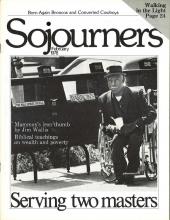A most basic problem of our present age is that of wealth and poverty. It confronts the Christian not only as a problem of his or her relationship to others in the same culture, but also as a world problem, as a response to the situation of brothers and sisters in the developing World. The problem touches each of us wherever we live and whenever we purchase or consume. It is a necessary problem of life, for we have a lifestyle, conscious or unconscious, which is either created according to Christian values or pre-packaged by our culture. This article cannot handle all the problems of creating a Christian lifestyle, but it does intend to set out, in condensed form, the relevant biblical material with special emphasis on the economic side of lifestyle. This data should enable one to dialogue with the biblical writers and thus discover the application of these principles in the modern world. We hope that out of this dialogue a conscious, fully-Christian lifestyle will become the goal of each reader.
Most of the themes expounded in the New Testament have their roots in the Old Testament. To begin with the Old Testament will also enable us to demonstrate that there is no real conflict between the Old Testament and the New; that, in fact, the tension which many Christians perceive is often the result of mistaken exegesis. We shall develop this Old Testament teaching as a series of five theses.
1) The Old Testament does not value asceticism for its own sake, but rather looks towards the collective well-being of the people of God as the ideal.
Read the Full Article

